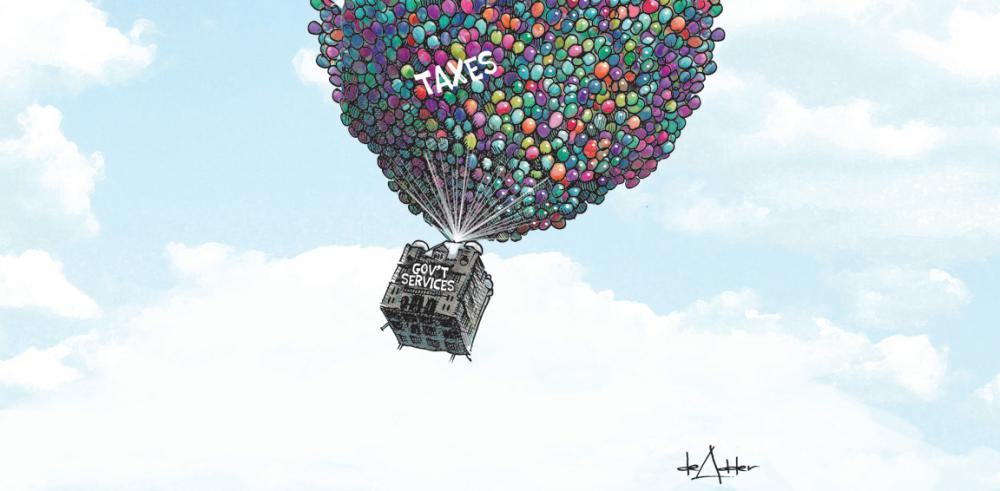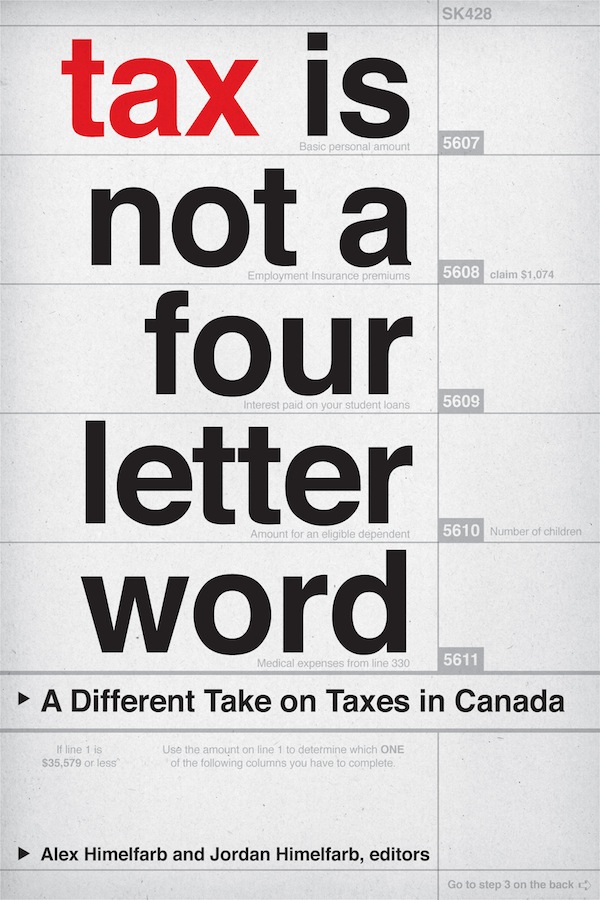
It's Time to Change the Conversation About Taxes
 Alex Himelfarb and Jordan Himelfarb, eds. Wilfrid Laurier University Press, 2013
Alex Himelfarb and Jordan Himelfarb, eds. Wilfrid Laurier University Press, 2013304 pages, $29.99
This compelling collection of articles takes up the challenge of turning the dial on the negative view of taxes that has come to characterize our political discourse. We’ve reached the point in Canada, including Ontario, where political leaders believe it would be suicide to raise the spectre of higher taxes. Economist Jim Stanford sums up the current conversation about taxes this way: “Taxes are increasingly portrayed as a burden from which government should be granting us relief. No more do we hear about the obligations – and the benefits – of our common citizenship, about how taxes tie us to one another and the common good . . . Gone is the language of citizen, replaced by the atomizing language of consumer and taxpayer.” The Canadian economists, sociologists, and researchers who contributed to this collection take up the task of having an “adult” conversation about what taxes are for and what is at stake if Canadians continue down the path of listening only to those who argue that we can cut taxes or avoid tax reform without serious consequences.
WHAT ARE TAXES FOR?
As described by researcher Trish Hennessy, historically taxes in Canada were used to pay down the deficit incurred during the First World War, finance our nation’s Second World War effort, and then support the infrastructure of our burgeoning cities. In recent times, arguably the most important role of taxes has been to provide the public services Canadians have come to expect and rely on. Public services are not only essential to all aspects of our lives; they contribute to reducing social and economic inequality. As economist Hugh Mackenzie argues: “For the vast majority of Canadians, the loss in value from a dollar not spent on public services is significantly greater than the loss from an equivalent increase in taxes. Why? Because the benefit from public services is distributed roughly equally among all Canadians, while revenue from taxation is not.” Clearly, the work performed by ETFO members to support our public school system is dependent on a robust tax base and public support for paying taxes.
FACTS ABOUT CANADIAN TAXES
Traditionally, Canadians have had a more favourable view of taxes and the role of government than our American neighbours. Recently, however, Canadians have succumbed to a concerted and effective conservative narrative about the need for austerity and lower taxes. Since the 1990s, federal and provincial governments have been reducing both corporate and personal income taxes. Mackenzie points out that Organization for Economic Co-operation and Development (OECD) data demonstrate that, since 1995, tax revenue in Canada has dropped from 36% to 31% of Gross Domestic Product (GDP), amounting to a decline of “more than $80 billion a year in public revenue.” Reducing the GST from 7% to 5%, for example, slashed $14 billion from federal revenues.
The ongoing anti-tax mantra from our politicians belies the fact that Canadian tax rates are low compared to those of other industrialized nations. Economists Eugene Lang and Philip DeMont review our recent tax history and conclude: “Canada is not a high-tax jurisdiction, as a lot of the political rhetoric and policy debate would lead one to believe. We live in a country with relatively low taxes compared to many other advanced democracies.” Economist Matt Fodor points out that Canada’s spending as a percentage of GDP has dropped significantly compared to other OECD nations. Between 1996 and 2007, it fell from 46.6% to 39.1% compared to a 0.7% reduction rate during the same period across the OECD. In contrast to some OECD nations, Canada has used expenditure cuts rather than tax tools to address the deficit.
EFFECTIVENESS OF THE RIGHT-WING NARRATIVE
This book makes an important contribution to our understanding of how conservative views in Canada have come to dominate the public view of taxes. It points out how conservative think tanks, like the well-funded Fraser Institute and the National Citizens Coalition, have promoted the notions, without corroborating evidence, that tax cuts contribute to economic growth and that governments get in the way of free market forces. This “neo-liberal” philosophy was championed by British Prime Minister Margaret Thatcher and U.S. President Ronald Reagan in the 1980s. Neo-liberalism represents a total rejection of the economic philosophy of John Maynard Keynes that informed the interventionist Western democracies and supported economic prosperity in the post-World War II period. Throughout the period dominated by neo-liberal economics, the more progressive political forces were caught unprepared to respond to the conservative narrative. As Fodor points out, in the face of economic upheaval, the “Left started to lose confidence, to worry that its traditional approach could not handle globalization and increasing capital mobility, nor withstand the attacks on taxes and ‘big government’ led by an increasing confident and organized business community.” Neo-liberalism has become entrenched in Britain, the U.S., and Canada. In Ontario, we experienced it in full force when the Progressive Conservative government of Mike Harris cut taxes and used the resulting fiscal deficit to justify expenditure cuts. The federal government of Stephen Harper is following the same script and Ontario PC leader Tim Hudak is promising to do the same.
CHANGING THE CHANNEL ON TAXES
How do we change the channel on the current negative view of taxes and the interventionist role of government? In Ontario, it is particularly challenging to talk about tax reform when the Opposition parties at Queen’s Park are almost solely focused on scandals related to government’s mismanagement of taxpayers’ money. It also doesn’t help that both the PCs and NDP are pressuring the Liberal government to make a commitment not to raise taxes. Part of the answer is to promote a tax system that is fair. Recent tax policy has contributed to a growing income gap in Canada and, as economists Marc Lee and Iglika Ivanova write, there is an “unprecedented concentration of wealth in the hands of a small group of super-rich Canadians.” Public opinion pollster Frank Graves suggests that a conversation about taxes has to be about “how to make government work for the majority, how to strengthen public services, and make wise investments.” Another part of the answer is to actively promote the positive role of taxes and counter the narrative that tax cuts create jobs. Political scientist Paul Saurette and his co-author Shane Gunster prescribe specific strategies that include investing in building a “robust progressive ideological infrastructure” by expanding upon the current work of progressive policy organizations like the Canadian Centre for Policy Alternatives and the Broadbent Institute, two organizations supported by ETFO. They also call on these think tanks to be more aggressive in getting out their message and refuting the counter-narratives, something the Broadbent Institute is striving to do, largely through social media. ETFO and its members can play an important role. We need to make the link between ETFO’s Building Better Schools agenda and a robust tax system that supports public services. We need to continue to promote a society where responsibility for others is valued over individualism. As Saurette and Gunster conclude, “Yes, people should be reminded that taxes are in their self-interest since they are linked to services. But the narrative shouldn’t limit it to this. Taxes are an obligation we have to each other.” The ultimate goal is to arrive at an informed discussion in which tax is no longer considered a four-letter word. Vivian McCaffrey is an executive staff member at ETFO.